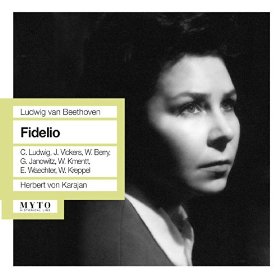
Herbert von Karajan once said listening to some of his old recordings made him envy painters who could simply burn the pictures they disliked. He’d quite possibly be stacking kindling for Myto’s 1962 Fidelio from Vienna, a hard-driving, impulsive performance
that reveals the maestro to be anything but an august stickler and stands out mostly for what it is not.
Invidious comparisons are hard to avoid because the formidable trio of Jon Vickers, Christa Ludwig and Walter Berry featured here recorded the same work earlier that year under Otto Klemperer, producing what many still regard as the finest Fidelio on disc. If that performance was all about structure and grandeur, Karajan’s relies on insistent pacing to build a dramatic arc over Beethoven’s unusual assortment of strophic numbers, larger scale arias and action ensembles. The orchestra is the storyteller, the scale more epic than human.
Oddly, the formidable collection of talent doesn’t quite pull it off. Though there are thrilling moments—Ludwig’s “Abscheulicher!” is a model of control and keen dramatic sensibilities, culminating in a blazing high B—Karajan’s forceful orchestral accompaniment simply overwhelms his singers at other moments. As Pizarro, Berry is drowned out in spots and left spitting out his lines as the music explodes out from under him in “Ha! Welch’ ein Augenblick!” The climactic prison scene hurtles by like a trash can lid in a windstorm, leaving even Ludwig sounding overdriven and off pitch.
Such a hell-for-leather approach sounds committed and uncompromising on first hearing and delivers the kind of rush you typically only experience live in a theater. Yet one also senses a certain lack of faith in the material’s ability to push the narrative forward, and no shortage of ego on the rostrum (Karajan’s not inconsequential cuts claim some of the spoken dialogue and all of Rocco’s first act aria “Hat man nicht auch Gold beineben.”)
Vickers is in especially rough voice, shouting through the rising passages of Florestan’s opening aria and sounding wan and unsteady in the Act 2 trio “Euch werde Lohn in besseren Welten.” Even if the anguished sound is dramatically appropriate for a character who’s been locked away for two years, the overall effect is jarring for a tenor who turned out elemental performances in this role for Klemperer and Karajan’s 1971 recording. It’s unknown whether illness, insufficient rehearsal time or some other distraction prompted such a mediocre outing.
The singer who fares best here is a young Gundula Janowitz, who sparkles as Marzelline in the early ensemble scenes opposite the Jaquino of Waldemar Kmentt and Walter Kreppel’s Rocco. While not the most deeply expressive of singers, Janowitz is Karajan’s kindred sprit when it came to legato, with a warm upper register that shows little of the strain that would become evident when she took on heavier roles. Eberhard Wächter brings great dignity to the final scene in the brief but important role of Don Fernando.
The Vienna State Opera Orchestra veers from outright sloppy in the opening chords of the overture to positively stirring in the Leonore Overture No. 3, which both brings down the house and saps the final scene of some momentum. Balances among sections and with the stage are hard to judge since the microphones are placed too close to the basses and timpani and distort the high strings during the loudest tuttis. The chorus is quite moving in the prisoners scene and bracing in the finale, rigorously following Karajan’s kinetic beat. The only prominent slip up comes from the first prisoner, sung by Kostas Paskalis, who jumps the gun and comes in a measure early.
Listeners who prize Karajan’s early work for its vigor and spontaneity may gravitate to this set looking for the same advantages found in his live 1952 Tristan from Bayreuth. Overall, it’s a comparatively weak entry in a catalogue filled with more convincing, better-rounded performances.
























Comments